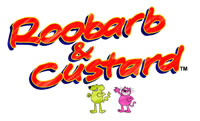 30-something nostalgics, rejoice: a new series of Roobarb and Custard is in production. IP owners and new series Executive Producers, A+B Productions have started work at Monster Animation Studios in Dublin. To be distributed by Celador, Roobarb and Custard Too uses hand-drawn and hand-animated cells coupled with modern production processes to produce a cartoon that is faithful to the original series.
30-something nostalgics, rejoice: a new series of Roobarb and Custard is in production. IP owners and new series Executive Producers, A+B Productions have started work at Monster Animation Studios in Dublin. To be distributed by Celador, Roobarb and Custard Too uses hand-drawn and hand-animated cells coupled with modern production processes to produce a cartoon that is faithful to the original series.
Hardcore R&C fans will be relieved to hear that there is no dodgy computer graphics work in the new version, and that the classic look has not been messed around with. Having done a side-by-side comparison with an early animation sample, I was very impressed by the R&C Too, and was keen to find out how they managed to recreate the distinctive look of the original. Adam Sharp, co-founder of A+B Productions told us “We’re using innovative ways to bring back the classic feel the original hand drawn series had.”
I spoke to Gerard O’Rourke at Monster Animation Studios about the painstaking process that A+B and Monster went through to get the correct look and feel: “Everything is hand-drawn. It’s then traditionally scanned into a computer and digitised. It’s then animated by hand, using a graphics tablet and is then rendered using a combination of Photoshop and Painter to achieve that marker pen feel. From there it’s composited together in After Effects – and then it’s over to post production to do the sound.”
And how did they reproduce the wobbly lines? “They recreate the drawing a number of times – when it’s played back if gives you the wobbly lines. Because you have to replicate the drawing a number of times, you have to do extra and copy them and offset them,” Gerard told us.
“The old version was done in the 70s, and you’ve probably heard the stories of them getting unemployed brickies and everyone they could find to work on Roobarb and Custard – and the reason they had that look that the markers had run out was because the markers had run out! They didn’t use animators all the time, but it did create its own feel and look – and we’ve been trying to increase the production values but not lose the charm of the programme.”
What about people who may be worried that it’s just a Flash update?
“We don’t want people to think that it’s a Flash project, because Flash can tend to be very flat and internet-based, but it is a great animating tool. But it really is only a tool like Word and Excel. It’s how you use it afterwards – take the different functions out of it and then use them with your own techniques and methods. We’ve taken all our software to its limits and used all the libraries and tools that we could get.”
Gerard seems very pleased with amount of care that A+B have been putting in to the new series: “Richard Bryers is narrating the series again, he’s doing all the voices. Grange Caveley, creator and writer has written all the new scripts.”
“It’s very much Roobarb and Custard 1974.”
Monster Animation
If you just can’t wait for the new version of Roobarb and Custard, here’s a selection of can-buy products from Amazon
DVD: Roobarb And Custard – The Complete Roobarb And Custard [1974]
VHS: Roobarb And Custard
 30-something nostalgics, rejoice: a new series of Roobarb and Custard is in production. IP owners and new series Executive Producers, A+B Productions have started work at Monster Animation Studios in Dublin. To be distributed by Celador, Roobarb and Custard Too uses hand-drawn and hand-animated cells coupled with modern production processes to produce a cartoon that is faithful to the original series.
30-something nostalgics, rejoice: a new series of Roobarb and Custard is in production. IP owners and new series Executive Producers, A+B Productions have started work at Monster Animation Studios in Dublin. To be distributed by Celador, Roobarb and Custard Too uses hand-drawn and hand-animated cells coupled with modern production processes to produce a cartoon that is faithful to the original series.